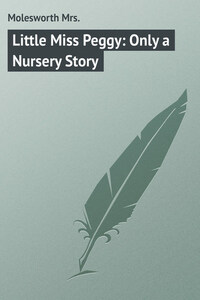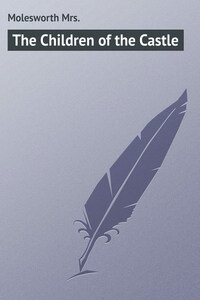CHAPTER I.
THE HOUSE IN THE LANE
It stood not very far from the corner – the corner where the lane turned off from the high-road. And it suited its name, or its name suited it. It was such a pretty, cosy-looking house, much larger really than it seemed at the first glance, for it spread out wonderfully at the back.
It was red too – the out-jutting front, where the deep porch was, looking specially red, in contrast with the wings, which were entirely covered with ivy, while this centre was kept clear of any creepers. And high up, almost in the roof, two curious round windows, which caught and reflected the sunset glow – for the front was due west – over the top of the wall, itself so ivy grown that it seemed more like a hedge, might easily have been taken as representing two bright, watchful eyes. For these windows were, or always looked as if they were, spotlessly clean and shining.
'What a quaint name! how uncommon and picturesque!' people used to say the first time they saw the house and heard what it was called. I don't know if it will spoil the prettiness and the quaintness if I reveal its real origin. Not so very long ago, the old house was a queer, rambling inn, and its sign was the redbreasted bird himself; somewhere up in the attics, the ancient board that used to swing and creak of a windy night, was still hidden – it may perhaps be there to this day! And somebody (it does not matter who, for it was not any somebody that has to do with this story) took a fancy to the house – fast growing dilapidated, and in danger of sinking from a respectable old inn into a very undesirable public-house, for the coaches had left off running, and the old traffic was all at an end – and bought it just in time to save it from such degradation.
This somebody repaired and restored it to a certain extent, and then sold it again. The new owner enlarged and improved it, and built the high wall which now looked so venerable; for already this was many, many years ago. The present owner of Robin Redbreast was the daughter of this gentleman – or nobleman rather – and she had lived in it ever since the death of her husband, fully twenty years ago.
She was an old woman now. Her name was Lady Myrtle Goodacre. The Goodacres, her husband's family, belonged to a distant county, and when her Mr Goodacre died, her connection with his part of the country seemed to cease, for she had no children, and her thoughts turned to the neighbourhood of her own old home, and the pretty quaint house not very far from it, which had been left her by her father, the late earl. And thither she came. But she was not exactly a sociable old lady, and few of the Thetford people knew her. So that there grew to be a slight flavour of mystery about Robin Redbreast.
The lane was about three-quarters of a mile from the little town of Thetford. Not that it was a little town in its own estimation; like many small things, it thought itself decidedly important. It was a pleasant, healthy place, and of late years it had wakened up a good deal in some directions, of which education was one, so that several families with boys and girls in want of schooling came and settled there. For the grammar-school was now prospering under an excellent and energetic head-master, and there was talk of a high-school for girls.
But this latter institution was still in the clouds or the air, and so far, the girls of Thetford families had to content themselves with the teaching to be obtained at two steady-going, somewhat old-fashioned private schools, of which the respective heads were, oddly enough, the Misses Scarlett and the Misses Green. There were three Misses Scarlett and two Misses Green (I fear they were more often described as 'The Miss Scarletts' and 'The Miss Greens'), and all five were ladies of most estimable character.
There was no rivalry between the two schools. Each had and held its own place and line. Ivy Lodge and Brook Bank were perfectly distinct, so distinct that neither trod on the other's toes. The former, that presided over by the Scarlett sisters, was recognisedly for the daughters of the Thetford upper ten thousand; Brook Bank existed for the little maidens belonging to the shopkeepers and small farmers of and near the town. Nowadays a high-school would ignore such distinctions and absorb them all – whether for better or worse is a matter of opinion. But as things were, I don't think any harm came from the division of classes; thanks in great measure, very probably, to the good sense and feeling of the heads of the two schools. On the rare occasions on which the Misses Scarlett met the Misses Green – at great parish entertainments or fancy fairs – the latter gave precedence to the former with ready and smiling deference, sure to be graciously acknowledged by old white-haired Miss Scarlett with a kindly hand-shake or 'Many thanks, Miss Green;' the younger sisters following suit. For the Scarletts were well-born, much better born, indeed, than some of their pupils, and the Greens had got themselves educated with difficulty, and in their present position were higher on the social ladder than any of their progenitors had ever been – higher socially and more successful practically than they themselves had in past days dared to hope to be. Financially speaking, it was well known in Thetford that the Greens had made a much better thing of their school than the Scarletts. The Scarletts were inclined to be too liberal and too generous. Their boarders were in many instances the children of former friends or connections, who found it convenient to trade upon such ties when the questions and difficulties of education arose, and to suggest that














